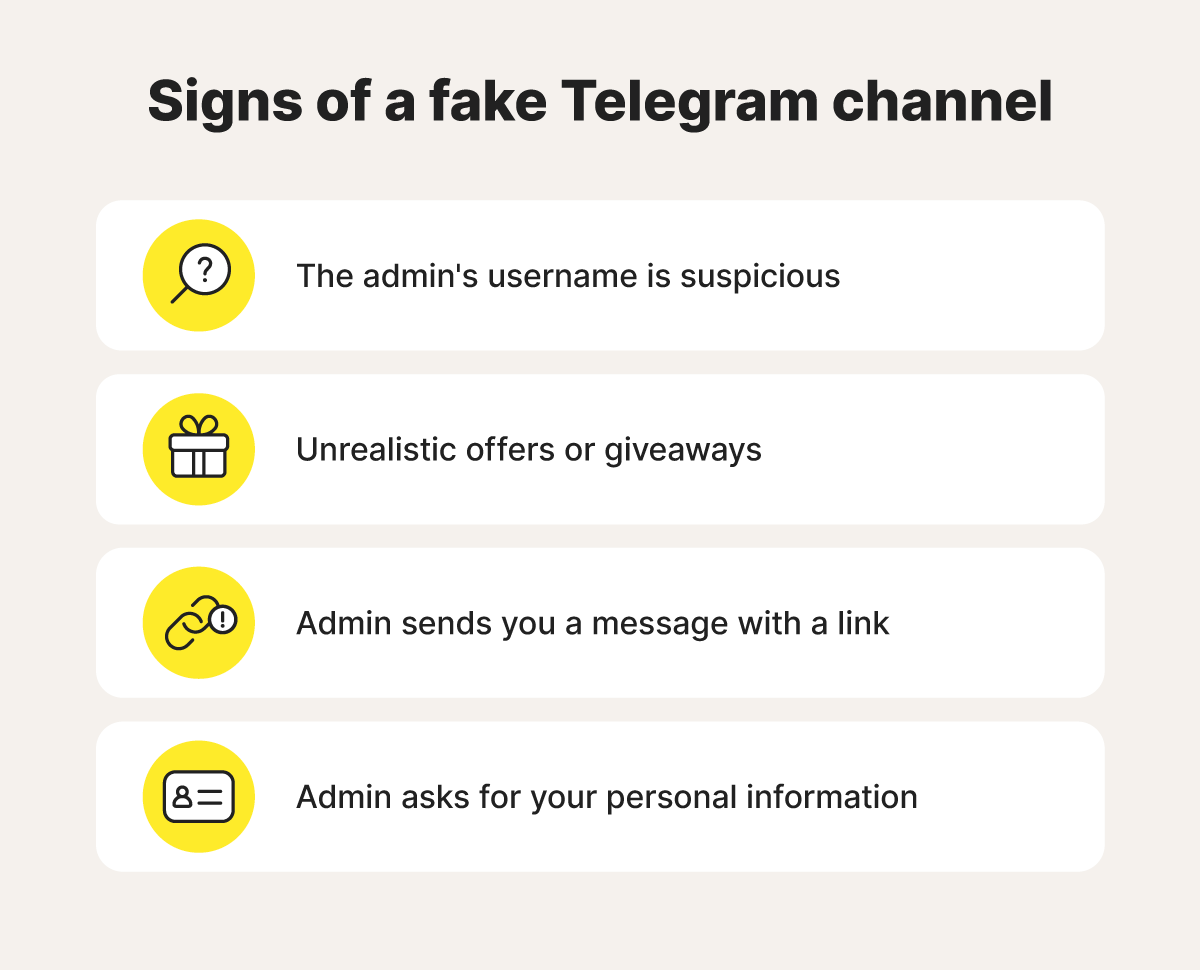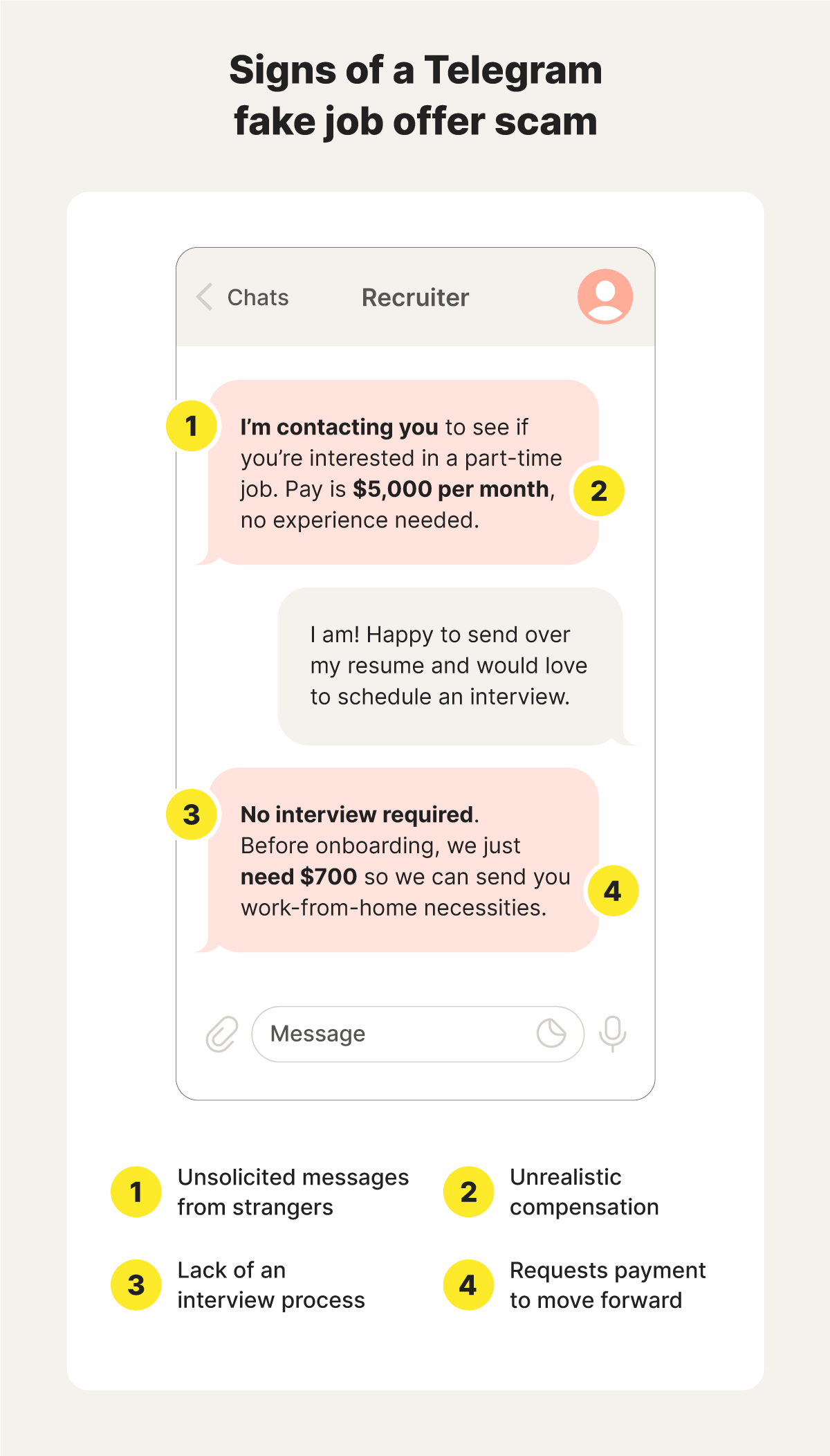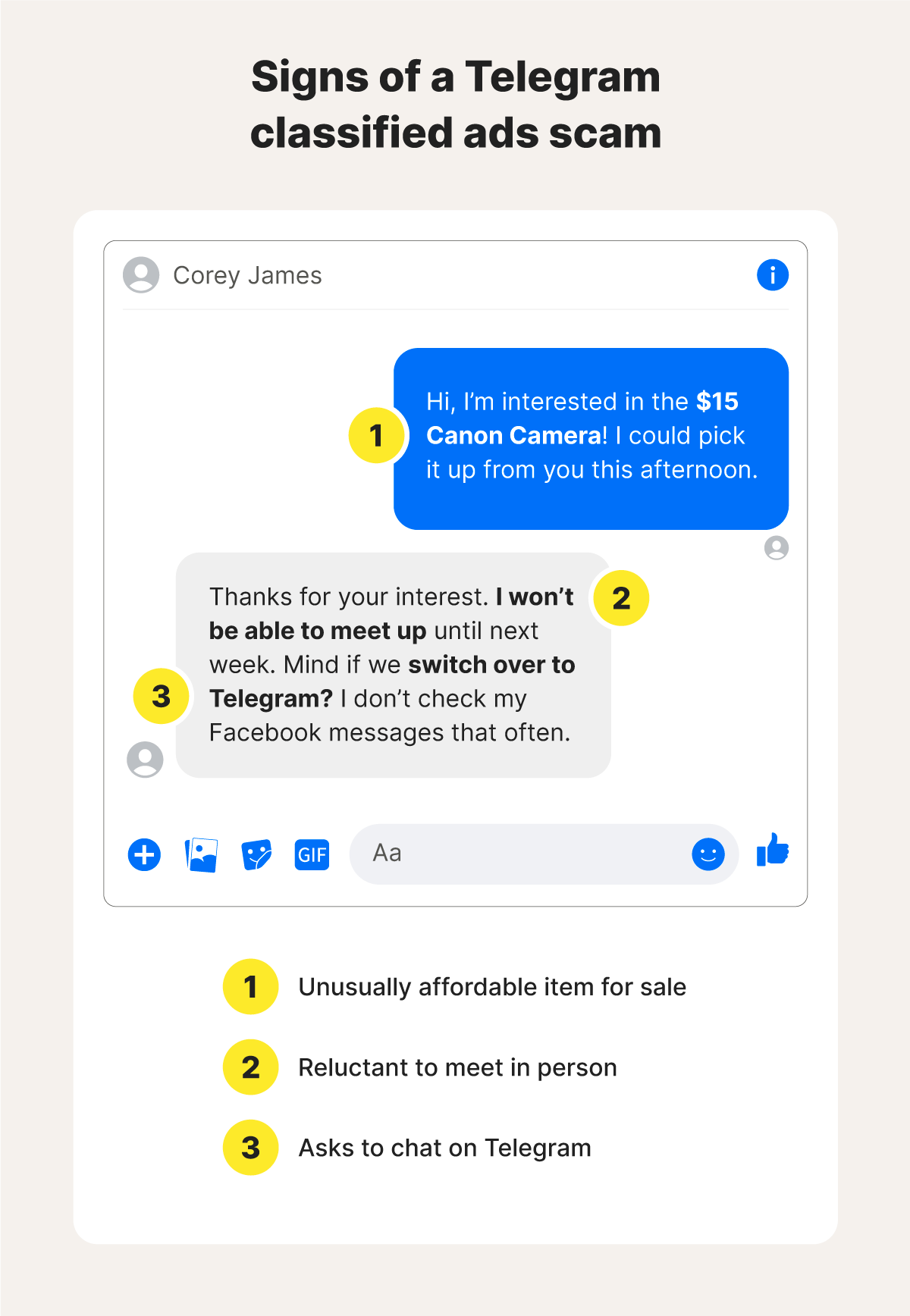† LifeLock does not monitor all transactions at all businesses.
Telegram is a trademark of Telegram FZ-LLC.
Telegram is a popular messaging app with over 950 million active users. The app lets you send messages, hop on video calls, and join channels that broadcast information to large audiences. Telegram is a great way to stay connected to family and friends, and the app offers built-in security features to help protect users. But its anonymity features have also attracted scammers and cybercriminals to the platform.
Keep reading to discover 11 common Telegram app scams and tips for how to help avoid them.
What are Telegram app scams?
Telegram messenger scams are deceitful schemes that cybercriminals use to obtain personal information or payment details from Telegram users. Scammers can then use this information to steal your identity or sell it on the dark web.
Although Telegram has security measures to protect users, determined criminals can still take advantage of the app’s privacy features to interact with users without revealing personal information that could get them caught. Scammers can hide their phone number in favor of a username and certain chats are encrypted end-to-end so messages can’t be monitored.
Let’s look at some of the scams you may be targeted by on Telegram.
1. Fake Telegram channels
Telegram channels are a form of broadcast messaging that allow individual users to send messages to larger audiences. Scammers create fake channels that look almost identical to legitimate, popular ones. They then contact users on the channel and attempt to gather personal information or trick them into clicking a link that installs malware onto their devices.
Fake Telegram channels may mimic the names of legitimate ones, but scammers can’t duplicate the exact username of a verified channel’s admin. Always check for slight variations in the username, and look for the blue verification check mark next to the channel’s name (only official Telegram channels for well-known brands or public figures have check marks).
When joining a new channel, be careful if an admin messages you directly asking you to click a link or share personal information—this is often a red flag. Additionally, fake links in public posts, such as in prize giveaways or unrealistic offers, may lead to malicious websites.


2. Tech support scams
Some scammers use bots to scan Telegram channels for users who are communicating various issues with companies. Once they identify a target, they pose as a company representative and request sensitive information or try to gain remote control of a device to install malware under the guise of offering "assistance."
If you experience an issue with a product or service, contact the relevant company directly through the organization's website or an official channel. That way, you’ll reach legitimate company representatives, helping you avoid scams and keep your info safe.
3. Impersonation scams
Similar to tech support scams, impersonation scams involve cybercriminals pretending to be public figures or organizations. They exploit the positive reputation of these accounts to trick people into sharing personal information.
To spot an impersonation scam, start by checking the username of the account messaging you. Since Telegram doesn’t allow multiple users to have the same username, watch out for lookalike accounts that contain misspellings or use numbers instead of letters, such as replacing the letter "O" with the number "0."
4. Romance scams
Telegram romance scams target individuals seeking love by tricking them into believing in the chance of a genuine romantic relationship. Many of these scams begin on dating apps like Tinder, where the scammer convinces the victim to move their conversation to Telegram.
Once on the messaging app, the scammer may request money via a cash app wire transfer or another payment method that’s hard to track. They may claim they need the money to pay a babysitter to watch their child before a first date, for example, or to purchase a plane ticket to meet up in person. Once the money is sent, the scammer will likely make an excuse to cancel or just vanish entirely.
Receiving a request for money or sensitive personal information from someone you don’t know in real life is a good sign that you’re chatting with a scammer. That’s especially true if they claim to live far away, providing a convenient excuse as to why they can't meet up.
5. Fake job scams
Some scammers target job seekers on Telegram with fake job offers and listings. But, before "new hires" can begin work, they’re asked to provide personal information like their Social Security number or to send payment for work-from-home necessities like a computer.
Before accepting a job offer, research the organization that’s hiring you. If you can’t find information about the company, it's likely a scam. Additionally, legitimate organizations won’t require payment for resources like training materials or technology. Be especially wary of offers from jobs you never applied for.


6. Cryptocurrency scams
Scammers on Telegram often target cryptocurrency enthusiasts by posing as experts offering fake investment opportunities. They start by promising high, guaranteed returns, enticing users to invest, and after transferring funds to a “special” exchange account, users are shown fake growth charts to build trust. But when they try to withdraw, the scammer vanishes, leaving them empty-handed.
Cryptocurrency markets are also used in pump-and-dump scams on Telegram. Channel admins claim to have insider knowledge about a cryptocurrency and generate fake hype to drive interest. As users invest, the price rises, allowing the scammers to sell for a profit before it crashes. Some scammers even charge fees for VIP memberships to these channels.
To avoid falling victim to these scams, be skeptical of anyone promising guaranteed returns, be wary of groups that promise guaranteed profits or pressure you to act quickly on "insider" tips, and verify the legitimacy of any investment opportunity before proceeding.
7. Fake giveaways
Telegram scammers may lure users into sharing personal information through fake giveaways, posing as celebrities or hawking fraudulent brand promotions with enticing prizes. They’ll ask users to complete a survey or provide details, aiming to collect usernames, emails, or other sensitive data. To avoid these traps, verify any giveaway on the official website or social media channels before sharing personal information.
8. Investment scams
Some Telegram fraudsters pose as investment firms or traders, promising high returns with little risk. They persuade users to send money via cash apps for investments, often providing fake data showing supposed profits. In reality, the scammers steal the victims' funds or banking information and then disappear.
Scammers also run Ponzi schemes on Telegram. These are fraudulent investment scams that pay early investors using contributions from later investors rather than legitimate profits. Telegram Ponzi schemes gain traction from word of mouth within investment groups. Eventually, they collapse, leaving most investors with financial losses.
As a rule of thumb, if something sounds too good to be true, it probably is. Be wary of making investments that guarantee profits with little to no risk.
If you want professional help managing your investments, work with a financial advisor who holds reputable credentials like the following:
- Certified Financial Planner (CFP)
- Chartered Financial Analyst (CFA)
- Personal Financial Specialist (PFS)
9. Fake classified ads scams
Classified ad scammers create fake listings for items on platforms like Facebook Marketplace, asking buyers to contact them via Telegram. Once contacted, they use bots to steal personal information or bank details. To spot this scam, watch out for suspiciously low prices and sellers pushing to continue the conversation on Telegram.


10. Friend-in-need scams
Fraudsters running a friend-in-need scam on Telegram will find your social media accounts to get information about your friends or family. They then contact you, impersonating a loved one in urgent need and asking for money.
You can reduce the chance of scammers finding your social media account by sharing your personal details only with people you trust. And if you suspect a fraudster has reached out, contact directly the person you believe they’re impersonating, using a phone number saved on your device to confirm their safety and situation.
11. Malware links
Telegram scammers may post or send you a link to another website, claiming you can easily contact a company, win a prize, or access exclusive offers. Clicking this link can install malware on your device, granting scammers access to personal details like passwords or credit card numbers and putting your identity at risk.
To shield yourself from these types of scams, never click links from unknown or untrusted sources. If you’re ever in doubt about the legitimacy of a link you’ve been sent on Telegram, hover over the URL before clicking to check that it matches the real version of the website.
How to protect against Telegram app scams
Now that you know the types of tricks scammers have up their sleeves, let's take a closer look at some strategies you can use to help identify and protect yourself against Telegram scams.
- Double-check usernames: Telegram doesn’t allow multiple accounts to share the same username. Impersonation accounts often contain misspellings, unusual symbols, or numbers.
- Watch out for unsolicited messages: Unsolicited messages from Telegram users you don’t know should raise red flags. If a stranger asks for personal information or tries to get you to click a link, ignore and block them.
- Never share sensitive information: It’s never a good idea to share sensitive information like your address or credit card number with unknown or untrusted Telegram users.
Steps to take if you fall victim to a Telegram scam
Knowing how to avoid Telegram scams is the best way to minimize the risk of your personal or financial information falling into the wrong hands. But if you do fall for a scam on Telegram, it’s vital that you report the scam and take steps to protect yourself.
Here are some simple steps you can take to limit the damage:
- Report the suspected scam account: Send a screenshot of your chat and any additional relevant information directly to the official @notoscam account on Telegram.
- Block the suspected scam account: Click the three dots in the corner of the chat screen and select Block user.
- Change your passwords: Create strong and unique passwords for all your accounts, especially any potentially compromised accounts that you may have used to provide information to a scammer.
- Monitor your financial accounts: Stay alert for any suspicious activity and report suspected fraudulent transactions to the relevant financial institution immediately.
- File an FTC report: Submit a report on the official FTC fraud report page to alert the authorities about the Telegram scam.
Staying safer against Telegram scams
Understanding the different ways scammers can exploit the Telegram platform is important. But more sophisticated protection is needed as scammers become more creative with their schemes.
LifeLock provides extra security against scammers by helping you remove your personal information from public data broker websites and alerting† you to suspicious activity to help you move quickly to secure compromised accounts. And if you do ever fall for a scam that leads to identity theft, LifeLock will provide dedicated U.S.-based identity restoration specialists to help you recover.
FAQs
Is the Telegram app legit?
Yes, Telegram is a legitimate messaging app available for Android, iPhone, iPad, PC, and macOS, with over 950 million users. Many users appreciate its privacy features and the ability to connect with others globally, even in restricted regions. However, like any popular platform, Telegram also attracts scammers who attempt to exploit users.
Why do scammers use Telegram?
Telegram offers a high degree of anonymity. Users can sign up using just a telephone number, which can then be hidden during conversations. This can make it attractive to scammers who want to conceal their identity. Telegram chats offer end-to-end encryption and feature minimal moderation, which may reduce the chances of scammers getting caught.
How do you identify a fake Telegram account?
A few red flags that a Telegram account is fake include:
- Minimal activity and profile details
- Stolen or generic profile pictures
- Misspelled or unusual usernames
- A missing blue checkmark for famous people or businesses
Editor’s note: Our articles provide educational information. LifeLock offerings may not cover or protect against every type of crime, fraud, or threat we write about.
This article contains
- What are Telegram app scams?
- 1. Fake Telegram channels
- 2. Tech support scams
- 3. Impersonation scams
- 4. Romance scams
- 5. Fake job scams
- 6. Cryptocurrency scams
- 7. Fake giveaways
- 8. Investment scams
- 9. Fake classified ads scams
- 10. Friend-in-need scams
- 11. Malware links
- How to protect against Telegram app scams
- Steps to take if you fall victim to a Telegram scam
- Staying safer against Telegram scams
- FAQs
Start your protection,
enroll in minutes.
LifeLock is part of Gen – a global company with a family of trusted brands.
Copyright © 2026 Gen Digital Inc. All rights reserved. Gen trademarks or registered trademarks are property of Gen Digital Inc. or its affiliates. Firefox is a trademark of Mozilla Foundation. Android, Google Chrome, Google Play and the Google Play logo are trademarks of Google, LLC. Mac, iPhone, iPad, Apple and the Apple logo are trademarks of Apple Inc., registered in the U.S. and other countries. App Store is a service mark of Apple Inc. Alexa and all related logos are trademarks of Amazon.com, Inc. or its affiliates. Microsoft and the Window logo are trademarks of Microsoft Corporation in the U.S. and other countries. The Android robot is reproduced or modified from work created and shared by Google and used according to terms described in the Creative Commons 3.0 Attribution License. Other names may be trademarks of their respective owners.





